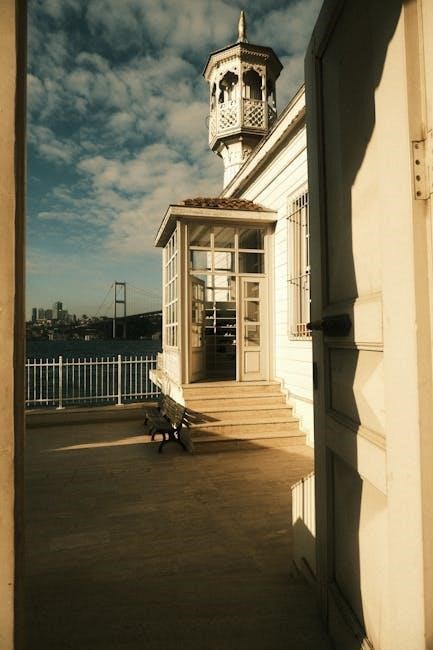A View from the Bridge: An Overview
A View from the Bridge delves into a man’s self-destructive path‚ fueled by a fatal flaw and a lack of self-awareness.
The play is a timeless story‚ examining themes of betrayal‚ jealousy‚ and desire.
Arthur Miller’s Classic Tragedy
Arthur Miller’s A View from the Bridge stands as a quintessential American tragedy‚ exploring the downfall of Eddie Carbone‚ a longshoreman in 1950s Brooklyn. The play masterfully blends elements of Greek tragedy with a distinctly modern‚ urban setting.
The play is largely concerned with discovery and how events unravel as the story progresses‚ a story fueled by Eddie’s hidden desires and the arrival of his wife’s cousins from Italy. Miller utilizes Alfieri‚ an Italian-American lawyer‚ as a chorus figure‚ framing Eddie’s story within a context of inescapable fate.
Through Eddie’s tragic flaw‚ the play examines themes of forbidden love‚ immigration‚ justice‚ and the destructive nature of repressed desires. The play is a potent exploration of how personal weaknesses can lead to self-destruction. It is a classic because of its ability to resonate with audiences through timeless themes.

Character Analysis
The play’s strength lies in its complex characters. Each character contributes to the tragic narrative‚ revealing different perspectives on the central conflict and providing insight into the play’s core themes.
Eddie Carbone: A Tragic Flaw
Eddie Carbone‚ the protagonist of A View from the Bridge‚ is a complex character whose tragic flaw drives the play’s narrative. He is a longshoreman in Red Hook‚ Brooklyn‚ deeply connected to his family‚ particularly his niece Catherine. Eddie’s flaw lies in his inability to recognize his own feelings‚ specifically his repressed and ultimately destructive desires for Catherine.
This lack of self-awareness leads him down a path of jealousy‚ betrayal‚ and ultimately‚ self-destruction. He struggles to cope with Catherine’s growing independence and her attraction to Rodolpho‚ one of his wife’s cousins from Italy. Eddie’s actions‚ fueled by his hidden desires‚ violate his own moral code and the values of his community. His inability to confront his true feelings makes him a tragic figure‚ a man destroyed by his own internal conflicts.
Catherine: From Niece to Woman
Catherine’s journey in A View from the Bridge is a pivotal one‚ showcasing her transformation from a naive niece to an independent woman. Initially‚ she is presented as a young woman heavily reliant on Eddie‚ her uncle and guardian. He has been protective‚ even oppressive‚ keeping her close within the confines of their home.
As Catherine matures‚ she yearns for independence and experiences a growing fascination with the world beyond Red Hook. The arrival of Rodolpho sparks her interest in romance and a desire to forge her own path. She becomes fascinated by the idea of travelling and having new experiences. However‚ her pursuit of independence clashes with Eddie’s possessive nature‚ leading to conflict and ultimately‚ tragedy. Catherine’s evolution is central to the play’s exploration of forbidden desire.
Beatrice: The Silent Suffering Wife
Beatrice‚ Eddie’s wife‚ occupies a poignant position in A View from the Bridge‚ representing the silent suffering often endured by women in mid-20th century society. She is acutely aware of Eddie’s inappropriate feelings for Catherine‚ creating a palpable tension within the household. Beatrice attempts to mediate and reason with Eddie‚ but her efforts are often met with resistance and denial.
She is trapped between her love for her husband and her concern for her niece. She also desires Eddie’s affection‚ feeling neglected and unappreciated. As the play progresses‚ Beatrice’s voice grows stronger‚ and she confronts Eddie about his actions. Her suffering highlights the themes of betrayal‚ jealousy‚ and the destructive power of unspoken desires. She embodies quiet strength amidst turmoil.
Alfieri: The Chorus Figure
Alfieri‚ the lawyer in A View from the Bridge‚ functions as a chorus figure‚ offering commentary and insight into the unfolding tragedy. He acts as a narrator‚ introducing the story and providing context for Eddie Carbone’s actions. Alfieri understands the complexities of the situation‚ recognizing Eddie’s internal conflict and the inevitable consequences of his choices.
He serves as a voice of reason and morality‚ warning Eddie about the dangers of his obsessive desires. However‚ Alfieri is ultimately powerless to prevent the tragic outcome‚ drawing a parallel to lawyers in ancient times who could only watch as fate played out. His presence emphasizes the themes of justice‚ law‚ and the limitations of human intervention in the face of powerful emotions. He is a detached observer.

Themes in the Play
A View from the Bridge explores complex themes‚ including forbidden love and incestuous desire. It examines immigration and the challenges of adapting to a new culture‚ highlighting the pursuit of the American Dream.
Incestuous Desire and Forbidden Love

The play grapples with the potent and destructive force of incestuous desire‚ primarily through Eddie Carbone’s feelings for his niece‚ Catherine. This forbidden love forms a central conflict‚ driving the narrative and shaping Eddie’s actions. His inability to cope with Catherine’s growing independence and potential marriage triggers a descent into jealousy and irrationality.
Eddie’s repressed desires manifest as an obsessive control over Catherine‚ dictating her behavior and choices. The societal taboo surrounding incestuous feelings adds another layer of complexity‚ highlighting the internal struggle Eddie faces. He battles against his own desires‚ leading to a tragic unraveling of his moral compass.
The forbidden nature of his love contributes to his downfall‚ pushing him towards desperate measures to maintain his control over Catherine‚ ultimately resulting in his destruction.
Immigration and the American Dream
A View from the Bridge explores the complexities of immigration and the pursuit of the American Dream‚ particularly for Italian immigrants in mid-20th century Brooklyn. Marco and Rodolpho’s arrival from Italy highlights the hardships faced by those seeking a better life in America‚ escaping the problems of war-torn Europe.
The play contrasts the idealized vision of the American Dream with the harsh realities of adapting to a new culture and navigating social and economic challenges; The characters grapple with questions of identity‚ assimilation‚ and the sacrifices required to achieve their aspirations.
Their presence in Eddie’s home disrupts the existing family dynamic‚ exposing cultural clashes and challenging Eddie’s values. The play examines the ways in which the pursuit of the American Dream can both unite and divide individuals‚ ultimately leading to tragic consequences.
Justice and the Law
A View from the Bridge grapples with the themes of justice and the law‚ contrasting formal legal systems with personal codes of honor and morality. Alfieri‚ the lawyer‚ serves as a chorus figure‚ commenting on the limitations of the law and its inability to fully address the complexities of human emotions and motivations.
The play questions whether true justice can be achieved through legal channels alone or if it requires a deeper understanding of human nature and the circumstances that drive individuals to act. Eddie’s actions‚ driven by his internal conflicts‚ ultimately lead him to disregard both the law and the unwritten rules of his community.
His betrayal of Marco and Rodolpho underscores the tension between legal obligations and personal loyalties‚ raising questions about the nature of justice and the consequences of seeking it outside the bounds of the law. The play suggests that justice‚ in its purest form‚ is often elusive and subject to interpretation.

Plot Summary and Analysis
The plot unfolds in two acts‚ charting Eddie Carbone’s tragic downfall.
Rising tensions culminate in a devastating climax as hidden desires and betrayals shatter the family.
Act One introduces Eddie Carbone‚ a longshoreman‚ and his family in Red Hook‚ Brooklyn. We meet his wife‚ Beatrice‚ and his niece‚ Catherine‚ whom he has raised. The arrival of Beatrice’s cousins from Italy‚ Marco and Rodolpho‚ sets the stage for rising tension. Catherine is fascinated by Rodolpho‚ sparking Eddie’s unease. He struggles with his feelings for Catherine‚ which border on the possessive and inappropriate.
Eddie’s discomfort grows as Catherine and Rodolpho’s relationship deepens. He attempts to control Catherine‚ disapproving of her job and her growing independence. The act builds suspense as Eddie’s internal conflict intensifies‚ fueled by his repressed desires and jealousy. Alfieri‚ the lawyer‚ foreshadows the tragic events to come. The act concludes with a palpable sense of impending doom.
Act 2: The Unraveling and Tragic Climax
Act Two witnesses the complete unraveling of Eddie Carbone. Consumed by his incestuous desires for Catherine and his jealousy of Rodolpho‚ Eddie makes increasingly desperate choices. He attempts to discredit Rodolpho‚ questioning his masculinity and his intentions towards Catherine. His actions lead to a confrontation with Beatrice‚ who accuses him of his true feelings.
In a final act of desperation‚ Eddie reports Marco and Rodolpho to immigration‚ betraying his own family and community. The arrival of the immigration officers shatters the fragile peace within the Carbone household. Marco‚ enraged by Eddie’s betrayal‚ seeks justice. The play culminates in a violent confrontation where Eddie is fatally stabbed by Marco‚ fulfilling the tragic prophecy foreshadowed by Alfieri. Eddie dies‚ a victim of his own tragic flaw.

